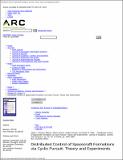| dc.contributor.author | Pavone, Marco | |
| dc.contributor.author | Arsie, Alessandro | |
| dc.contributor.author | Frazzoli, Emilio | |
| dc.contributor.author | Bullo, Francesco | |
| dc.date.accessioned | 2013-10-21T16:06:25Z | |
| dc.date.available | 2013-10-21T16:06:25Z | |
| dc.date.issued | 2011-08 | |
| dc.date.submitted | 2010-12 | |
| dc.identifier.issn | 0018-9286 | |
| dc.identifier.issn | 1558-2523 | |
| dc.identifier.uri | http://hdl.handle.net/1721.1/81455 | |
| dc.description.abstract | A widely applied strategy for workload sharing is to equalize the workload assigned to each resource. In mobile multiagent systems, this principle directly leads to equitable partitioning policies whereby: 1) the environment is equitably divided into subregions of equal measure; 2) one agent is assigned to each subregion; and 3) each agent is responsible for service requests originating within its own subregion. The current lack of distributed algorithms for the computation of equitable partitions limits the applicability of equitable partitioning policies to limited-size multiagent systems operating in known, static environments. In this paper, first we design provably correct and spatially distributed algorithms that allow a team of agents to compute a convex and equitable partition of a convex environment. Second, we discuss how these algorithms can be extended so that a team of agents can compute, in a spatially distributed fashion, convex and equitable partitions with additional features, e.g., equitable and median Voronoi diagrams. Finally, we discuss two application domains for our algorithms, namely dynamic vehicle routing for mobile robotic networks and wireless ad hoc networks. Through these examples, we show how one can couple the algorithms presented in this paper with equitable partitioning policies to make these amenable to distributed implementation. More in general, we illustrate a systematic approach to devise spatially distributed control policies for a large variety of multiagent coordination problems. Our approach is related to the classic Lloyd algorithm and exploits the unique features of power diagrams. | en_US |
| dc.description.sponsorship | National Science Foundation (U.S.) (Grant 0705451) | en_US |
| dc.description.sponsorship | National Science Foundation (U.S.) (Grant 0705453) | en_US |
| dc.description.sponsorship | United States. Office of Naval Research (Grant N00014-07-1-0721) | en_US |
| dc.language.iso | en_US | |
| dc.publisher | Institute of Electrical and Electronics Engineers (IEEE) | en_US |
| dc.relation.isversionof | http://dx.doi.org/10.1109/tac.2011.2112410 | en_US |
| dc.rights | Creative Commons Attribution-Noncommercial-Share Alike 3.0 | en_US |
| dc.rights.uri | http://creativecommons.org/licenses/by-nc-sa/3.0/ | en_US |
| dc.source | MIT Web domain | en_US |
| dc.title | Distributed Algorithms for Environment Partitioning in Mobile Robotic Networks | en_US |
| dc.type | Article | en_US |
| dc.identifier.citation | Pavone, Marco, Alessandro Arsie, Emilio Frazzoli, and Francesco Bullo. “Distributed Algorithms for Environment Partitioning in Mobile Robotic Networks.” IEEE Transactions on Automatic Control 56, no. 8 (August 2011): 1834-1848. | en_US |
| dc.contributor.department | Massachusetts Institute of Technology. Department of Aeronautics and Astronautics | en_US |
| dc.contributor.department | Massachusetts Institute of Technology. Laboratory for Information and Decision Systems | en_US |
| dc.contributor.mitauthor | Frazzoli, Emilio | en_US |
| dc.relation.journal | IEEE Transactions on Automatic Control | en_US |
| dc.eprint.version | Author's final manuscript | en_US |
| dc.type.uri | http://purl.org/eprint/type/JournalArticle | en_US |
| eprint.status | http://purl.org/eprint/status/PeerReviewed | en_US |
| dspace.orderedauthors | Pavone, Marco; Arsie, Alessandro; Frazzoli, Emilio; Bullo, Francesco | en_US |
| dc.identifier.orcid | https://orcid.org/0000-0002-0505-1400 | |
| mit.license | OPEN_ACCESS_POLICY | en_US |
| mit.metadata.status | Complete | |
